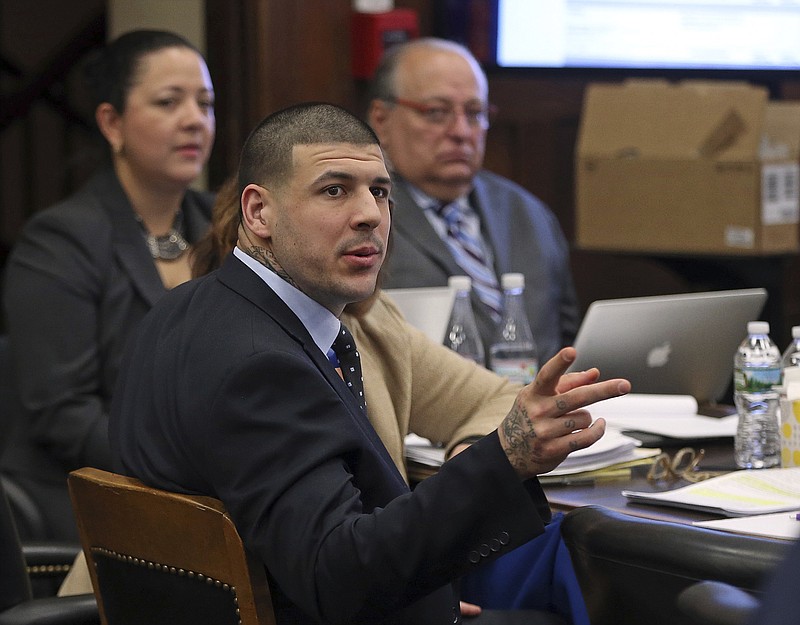Tragedy.
When New England coach Bill Belichick was recently asked to provide one word to describe former Patriots tight end and convicted murderer Aaron Hernandez, "tragedy" was his word of choice.
And there have certainly been many words spoken and written over the past 24 hours concerning the tragedy that was Hernandez's troubled life in the wake of the news he was found hanged with a bed sheet inside his prison cell Wednesday morning. Prison officials said it was a suicide.
But what about the tragedy that was Odin Lloyd, whose life Hernandez was convicted of snuffing out on June 17, 2013?
Or the tragedy of Hernandez's 4-year-old daughter Avielle? Just last week she sat in a courtroom watching her dad stand trial for a double murder, with the jury acquitting Hernandez. That verdict wasn't going to end his life prison sentence for Lloyd's murder, but had Hernandez not killed himself, she might have at least grown to know him as something more than a man standing trial for a double murder.
There is also this tragedy, however, one that plays out too often regarding those blessed with outrageous athletic or entertainment gifts. That's the tragedy of undeserved forgiveness for any wrong as long as that person can still deliver the goods on the field, court, stage or recording studio.
Merely consider this quote from an NFL scout that ran in an ESPN.com story last week regarding Hernandez during his University of Florida playing career: "There was so much dirt on Aaron Hernandez. It seemed you could dig up as much as you wanted. You could dig up enough to take him off your draft board, or you could stop at a certain point because you wanted to keep him alive on your draft board."
If you don't like that one, try this from an NFL executive in the same article: "When I saw some of the (stuff) he was able to get away with (at Florida), we weren't taking him. He actually thought he was going to get away with murder. He always thought he could beat the system, and when he got arrested I thought, 'Well, the system finally caught up with him.'"
You can't save everybody. Some people are just bad to the bone. At the very top of that list might be Adolf Hitler - whom we grudgingly acknowledge was born 128 years ago today. Slightly further down that list might stand Charles Manson. But Hernandez's actions merit at least an honorable mention on the disreputable people list, if only for his apparent unrepentant behavior throughout a good number of his 27 stormy years of life.
After all, though he was acquitted of murdering two men last week, one reason he was charged with those deaths was because he apparently flew into a rage over one of the men spilling a drink on him at a nightclub. His actions led police to the conclusion that he was angry enough to commit murder.
Not six weeks ago, while I was sitting with a veteran reporter from Florida during a break at the Southeastern Conference men's basketball tournament in Nashville, a picture of Hernandez appeared on ESPN. The reporter began to talk about all the breaks former Gators coach Urban Meyer, now at Ohio State, seemingly gave the player during his years there - everything from drug concerns to Hernandez allegedly puncturing the eardrum of a restaurant employee after refusing to pay a bill to possibly firing shots into a car at a stoplight.
Of that last incident, Hernandez reportedly refused to talk to police, and no charges were ever filed. But it seems at every turn his ability to play well on the field overwhelmed anyone's desire to make him behave well off it.
And he could definitely play.
Former University of Tennessee wide receiver and 10-year NFL veteran Donté Stallworth - once sent to jail himself for killing a pedestrian while driving under the influence - said of Hernandez in the ESPN.com story: "To me, he was on his way to being in the Hall of Fame."
One NFL executive who passed on Hernandez because of his reputation told the website of the player's first two years in the league: "We were like, 'Wow, I guess we blew that one. All those concerns were for naught.'"
Instead, as sometimes happens, the concerned were rewarded. Hernandez proved to be an even bigger thug than anyone thought possible.
Does that mean no one deserves a second or third chance? Absolutely not. Just look at Stallworth, who voluntarily allowed himself to be convicted of a felony because he felt it was the morally right thing to do.
Suspended by the NFL for the entire 2009 season without pay, Stallworth came back to play several more years. He now works for Valens Global as a strategy consultant, where he focuses on securing public venues against terrorist attacks.
Tough love often seems to be the best love when attempting to alter destructive behavior. The real tragedy of Hernandez is the tough love never seemed to arrive. Instead, he was allowed to get away with enough stuff he shouldn't have until he thought he could get away with murder.
It's up to the rest of us to see that the system catches up to the next Aaron Hernandez before someone's life is lost by our tragic inaction.
Contact Mark Wiedmer at mwiedmer@timesfreepress.com.

